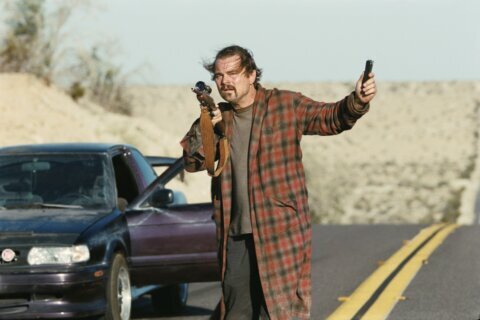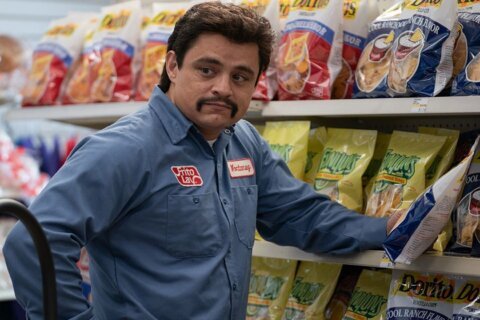Jason Fraley, WTOP film critic
WASHINGTON – Try as they might, producers can never truly predict the climate in which their films will be released. The timing can work to a film’s advantage, as it did for “Argo,” where the attack on the U.S. consulate in Benghazi made it a relevant pick for Best Picture at the Golden Globes.
Or, it can work to a film’s disadvantage, as it does for “Gangster Squad,” the release of which was originally set for September, but was delayed after the Colorado movie theater massacre.
Warner Bros. pulled the Jay-Z trailer and cut the biggest scene – a machine-gun attack at Grauman’s Chinese Theater – forcing the cast and crew to reshoot an alternate sequence.
As fate would have it, the new release date came in the aftermath of the Sandy Hook massacre in Newtown, Conn., where a gunman killed 26 people, including 20 first-graders. “Django: Unchained” seems to have survived the backlash, due to cartoonish violence and the reputation of Quentin Tarantino, while “Les Miserables” shrouded its child shooting amid three hours of singing.
“Gangster Squad,” on the other hand, is the perfect target for our gun-weary queasiness. Perhaps this is because it features the shooting of a shoe-shining child. Perhaps it’s because the violent trailer hit our TVs between Newtown news coverage. I happen to think it’s because the film is made so poorly that we critics are ready to dump all of our Newtown misgivings on it.
Untouchable topics can turn films into public enemies.
Based on a book by Paul Lieberman, the film follows a group of cops hunting real-life Jewish-mafioso Mickey Cohen (Sean Penn, “Mystic River”) in 1949 Los Angeles. Police Chief Bill Parker (Nick Nolte, “The Prince of Tides”) assigns Sgt. John O’Mara (Josh Brolin, “No Country for Old Men”) to round up a squad of detectives, including Coleman Harris (Anthony Mackie, “The Hurt Locker”), Conway Keeler (Giovanni Ribisi, “Saving Private Ryan”), Navidad Ramirez (Michael Pena, “End of Watch”), Max Kennard (Robert Patrick, “T2: Judgment Day”) and Sgt. Jerry Wooters (Ryan Gosling, “Drive”), who falls for Cohen’s sexy girlfriend Grace Faraday (Emma Stone, “The Help”).
The star-studded cast has 10 Oscar nominations between them – Penn (5), Nolte (3), Brolin (1), Gosling (1). Still, there’s nothing worse than talented actors trapped inside weak storytelling.
Director Ruben Fleischer (“Zombieland”) shows flashes of potential, like freeze- frame gunfire and a “Goodfellas” single-take as Gosling enters a club. Still, he relies too heavily on slow motion and can’t decide whether he wants to make a candy-colored spoof like “Dick Tracy” (1990) or a work of gritty realism like “L.A. Confidential” (1997). The former earned three Oscar nominations with over-the-top villains like Big Boy Caprice (Al Pacino), Mumbles (Dustin Hoffman), Lips Manlis (Paul Sorvino) and Breathless Mahoney (Madonna), while the latter earned nine Oscar nominations, winning two for Best Supporting Actress (Kim Basinger) and Best Adapted Screenplay (Brian Helgeland, Curtis Hanson).
Oscar will forget “Gangster Squad” because Fleischer tries to juggle both, confusing us at to whether we’re supposed to take the film seriously or revel in its campy self-parody.
While Fleischer strikes a confusing tone, debut feature screenwriter Will Beall (TV’s “Castle”) struggles to blend his A-Story (the main plot) and B-Story (the love story subplot).
At first, the B-Story appears to be tension with O’Mara’s wife (Mireille Enos), but the next scene she smiles and helps him assemble his squad. We then realize the B-Story is Gosling and Stone, who made sparks in “Crazy, Stupid, Love” (2011), but aren’t given enough screen time here to develop the same girlfriend-stealing chemistry as Tony Montana and Elvira Hancock in “Scarface” (1983).
When Cohen uses a boxing analogy to call out Stone’s infidelity, it pales in comparison to Joaquin Phoenix’s “busy little bee” scene in “Gladiator” (2000).
Some films survive a weak B-Story by having a compelling A-Story, but the “Gangster Squad” hunt for Mickey Cohen contains too many inconsequential scenes. What do I mean by this? Take the scene out and see if it has any effect on the plot. The answer here is often “no,” which brings us to Fleischer’s removal of the Chinese Theater shooting scene.
The removal is indeed admirable, but its replacement (a failed hit job in Chinatown) has no impact on the story. Its Chinatown location merely reminds us of the script’s inferiority to Robert Towne’s “Chinatown” (1974), voted No. 3 on the WGA’s Top 101 Screenplays. While Towne’s scenes gradually peel back more layers of its L.A. mystery, Beall’s script feels like style over substance.
Let’s not write these filmmakers off just yet. I thoroughly enjoyed Fleischer’s “Zombieland” (2009) and Beall’s hardboiled dialogue plays perfectly off the delicious period piece visuals. Ironically, it’s this same crackling dialogue that seals “Gangster Squad’s” fate (paraphrasing):
“You think you’re something new, but you’re not. You think you have vision. You think you’re gonna shoot your way to the top. But when it’s all said and done, you’re gonna be eating your best parts.”
★ ★
The above rating is based on a 4-star scale. Follow WTOP Film Critic Jason Fraley on Twitter @JasonFraleyWTOP or check out his blog The Film Spectrum.








